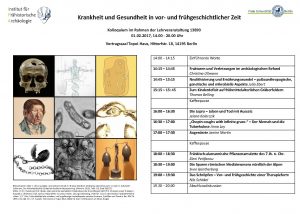Das Graduiertenkolleg 1876 „Frühe Konzepte von Mensch und Natur: Universalität, Spezifität, Tradierung“ der Johannes Gutenberg-Universität Mainz hat insgesamt
5 Promotionsstellen (wissenschaftliche/r Mitarbeiter/in, Entgeltgruppe 13 TV-L 65%)
zum 1. Oktober 2017 für zunächst zwei Jahre zu besetzen. Das Graduiertenkolleg wurde von der Deutschen Forschungsgemeinschaft (DFG) eingericht. Vorbehaltlich der Finanzierung durch die DFG besteht die Möglichkeit, die Stellen um ein weiteres Jahr zu verlängern.
Das Forschungsprogramm des Graduiertenkollegs verfolgt das Ziel, Konzepte von Mensch und Natur und deren Ursprünge im nordostafrikanischen, vorderasiatischen und europäischen Raum in der Zeit ab 100.000 Jahren v. Chr. bis zum Mittelalter – ausgehend von textuellen, bildlichen und materiellen Quellen – exemplarisch zu erfassen und kulturimmanent wie auch transkulturell zu untersuchen. Dazu werden vier Forschungsschwerpunkte betrachtet:
(1) Konzepte von Urzuständen und Urelementen, von Weltentstehung und Weltuntergang;
(2) Konzepte von Naturphänomenen, Naturgewalten und Naturkatastrophen;
(3) Konzepte von Flora, Fauna und Naturraum;
(4) Konzepte vom menschlichen Körper, von Krankheit, Heilung und Tod.
Die Dissertationsthemen sind jeweils einem dieser Bereiche und einer Fachdisziplin zuzuordnen.
Für weitere Informationen bitte hier klicken.



 Die
Die